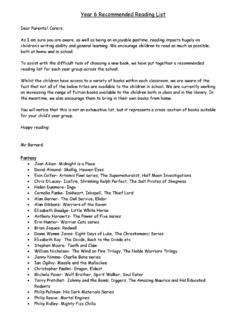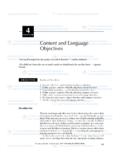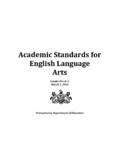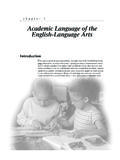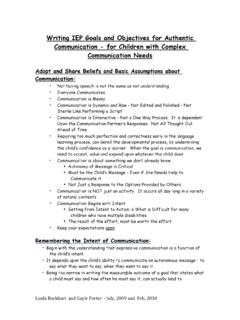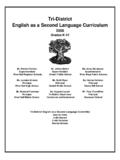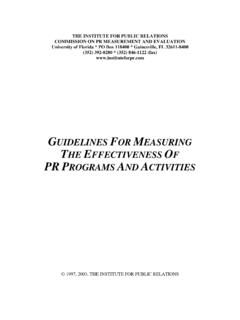Transcription of New National Curriculum 2014 Reading Objectives Year 1
1 New National Curriculum 2014 Reading Objectives year 1 To make the assessment of Reading slightly easier we have split the Objectives up into three groups. Guided Reading ; these are Objectives easily assessed through guided Reading Reading and spelling of words; these could be assessed during guided Reading , individual Reading or through phonics lessons Additional Objectives ; these link with speaking and listening. Guided Reading Objectives Key Stage Objective Child Speak Target KS 1 Y1 AF1 Read aloud accurately books that are consistent with their developing phonic knowledge and that do not require them to use other strategies to work out words. I correctly read aloud the words from my book. KS 1 Y1 AF1 Re read these books to build up their fluency and confidence in word Reading . I re read my books so that I become a better reader. KS 1 Y1 AF1 Checking that the text makes sense to them as they read and correcting inaccurate Reading .
2 I check what I am Reading makes sense as I am Reading through it. KS 1 Y1 AF2 Drawing on what they already know or on background information and vocabulary provided by the teacher. I understand the books I can read. KS 1 Y1 AF2 Discussing the significance of the title and events. I discuss the titles and events from the books I read. KS 1 Y1 AF2 Explain clearly their understanding of what is read to them. I can explain what has happened in the story someone has just read to me. KS 1 Y1 AF2 / 3 Predicting what might happen on the basis of what has been read so far. I like to predict what happens next based on what I have read so far. KS 1 Y1 AF3 Making inferences on the basis of what is being said and done. I can tell you about why a character does or says some things. KS 1 Y1 AF5 Discussing word meanings, linking new meanings to those already known. I discuss what words mean. KS 1 Y1 AF7 Being encouraged to link what they read or hear read to their own experiences.
3 When I read, I can tell you of similar things that have happened to me. Reading and Spelling Objectives Additional Objectives (SP&L etc) Key Stage Objective Child Speak Target KS 1 Y1 Apply phonic knowledge and skills as the route to decode words. I can read words by breaking them down into sounds. KS 1 Y1 Respond speedily with the correct sound to graphemes (letters or groups of letters) for all 40+ phonemes, including, where applicable, alternative sounds for graphemes. I quickly read my given letters or groups of letters. KS 1 Y1 Read accurately by blending sounds in unfamiliar words containing GPCs that have been taught. I read new words by blending letter sounds together. KS 1 Y1 Read common exception words, noting unusual correspondences between spelling and sound and where these occur in the word. I can read some unusual words. KS 1 Y1 Read words containing taught GPCs and s, es, ing, ed, er and est endings. I know how to read my word list words including words ending in s, es, ing, ed, er and est.
4 KS 1 Y1 Read other words of more than one syllable that contain taught GPCs. I can correctly read the longer words in my word list. KS 1 Y1 Read words with contractions [for example, I'm, I'll, we'll], and understand that the apostrophe represents the omitted letter(s). I can read words that contain missing letters such as I'm, I'll, and we'll. Key Stage Objective Child Speak Target KS 1 Y1 Listening to and discussing a wide range of poems, stories and non fiction at a level beyond that at which they can read independently. I listen and discuss what I have read, including poems, stories and non fiction books. KS 1 Y1 Becoming very familiar with key stories, fairy stories and traditional tales, retelling them and considering their particular characteristics. I can tell you about some special stories we have worked on in class and even re tell them to my teacher. KS 1 Y1 Recognising and joining in with predictable phrases. I like to join in with the class at special times of a story when the teacher is telling certain stories.
5 KS 1 Y1 Learning to appreciate rhymes and poems, and to recite some by heart. I have learned some rhymes or poems. KS 1 Y1 Participate in discussion about what is read to them, taking turns and listening to what others say. I take turns to listen and discuss when I am in a group. New National Curriculum 2014 Reading Objectives year 2 To make the assessment of Reading slightly easier we have split the Objectives up into three groups. Guided Reading ; these are Objectives easily assessed through guided Reading Reading and spelling of words; these could be assessed during guided Reading , individual Reading or through phonics lessons Additional Objectives ; these link with speaking and listening. Guided Reading Objectives Key Stage Objective Child Speak Target KS 1 Y2 AF1 Read most words quickly and accurately, without overt sounding and blending, when they have been frequently encountered. I can read most words quickly and accurately.
6 KS 1 Y2 AF1 Read aloud books closely matched to their improving phonic knowledge, sounding out unfamiliar words accurately, automatically and without undue hesitation. When I see a word I have not read before, I can sound out the word without help from an adult. KS 1 Y2 AF1 Re read these books to build up their fluency and confidence in word Reading . When I re read my books, I become better and better at Reading the text. KS 1 Y2 AF2 Discussing the sequence of events in books and how items of information are related. When I read, I am able to tell you about things in the order they happen and if they are connected. KS 1 Y2 AF2 Drawing on what they already know or on background information and vocabulary provided by the teacher. I understand the books I can read. KS 1 Y2 AF2 Answering and asking questions. I can answer and ask questions about what I have read. KS 1 Y2 AF2/3 Predicting what might happen on the basis of what has been read so far.
7 I like to guess what happens next in a story, using what I already know has gone on before. KS 2 Y2 AF3/6 Making inferences on the basis of what is being said and done. I can tell you why certain things happen in a book or why a character says the things they do. KS 2 Y2 5 Discussing and clarifying the meanings of words, linking new meanings to known vocabulary. I discuss the meaning of words. KS 2 Y2 AF5 Discussing their favourite words and phrases. I am happy to tell you my favourite words and phrases from my Reading . Reading and Spelling Objectives Additional Objectives (SP&L etc) Key Stage Objective Child Speak Target KS 1 Y2 Continue to apply phonic knowledge and skills as the route to decode words until automatic decoding has become embedded and Reading is fluent. I can read words quickly because I know how to sound out all parts of a word. KS 1 Y2 Read accurately by blending the sounds in words that contain the graphemes taught so far, especially recognising alternative sounds for graphemes.
8 I read by blending together the sounds I know and can read out within a word. KS 1 Y2 Read accurately words of two or more syllables that contain the same graphemes as above. I can read words with two or three syllables. KS 1 Y2 Read words containing common suffixes. I can read words with common word endings, such as ing and ed. KS 1 Y2 Read further common exception words, noting unusual correspondences between spelling and sound and where these occur in the word. I can read a range of unusual words from our word lists. Key Stage Objective Child Speak Target KS 1 Y2 Listening to, discussing and expressing views about a wide range of contemporary and classic poetry, stories and non fiction at a level beyond that at which they can read independently. I listen, discuss and can say what I think about poems, stories and non fiction books I have read. KS 1 Y2 Becoming increasingly familiar with and retelling a wider range of stories, fairy stories and traditional tales.
9 I can tell you about all the different stories I have read. KS 1 Y2 Being introduced to non fiction books that are structured in different ways. I enjoy finding out about non fiction books and how they are set out. KS 1 Y2 Recognising simple recurring literary language in stories and poetry. I can recognise simple language patterns in stories and poems. KS 1 Y2 Continuing to build up a repertoire of poems learnt by heart, appreciating these and reciting some, with appropriate intonation to make the meaning clear. I can say out loud a number of poems I have learnt. KS 1 Y2 Participate in discussion about books, poems and other works that are read to them and those that they can read for themselves, taking turns and listening to what others say. I take turns to discuss and listen to others about what I have read. New National Curriculum 2014 Reading Objectives year 3/4 To make the assessment of Reading slightly easier we have split the Objectives up into three groups.
10 Guided Reading ; these are Objectives easily assessed through guided Reading Reading and spelling of words; these could be assessed during guided Reading , individual Reading or through phonics lessons Additional Objectives ; these link with speaking and listening. Guided Reading Objectives Key Stage Objective Child Speak Target KS 2 Y3/4 AF2 Checking that the text makes sense to them, discussing their understanding and explaining the meaning of words in context. I check what I am Reading makes sense by talking about it. KS 2 Y3/4 AF2 Asking questions to improve their understanding of a text. I ask questions to help me understand more about a book. KS 2 Y3/4 AF2 Retrieve and record information from non fiction. I can use non fiction books to find out about things. KS 2 Y3/4 AF2 Participate in discussion about both books that are read to them and those they can read for themselves, taking turns and listening to what others say.
